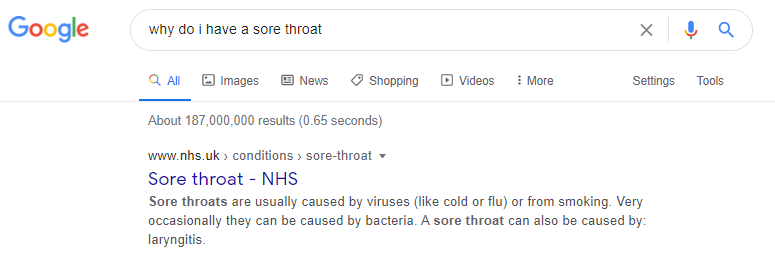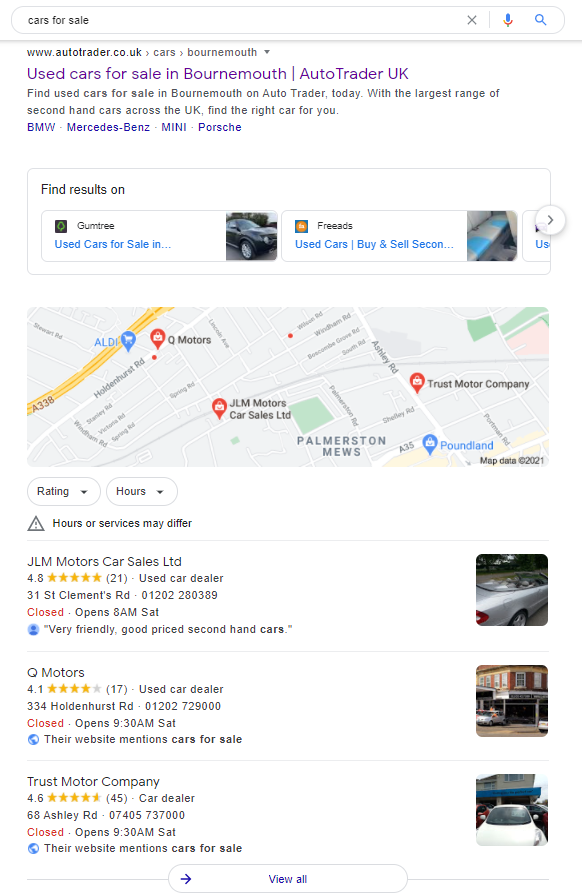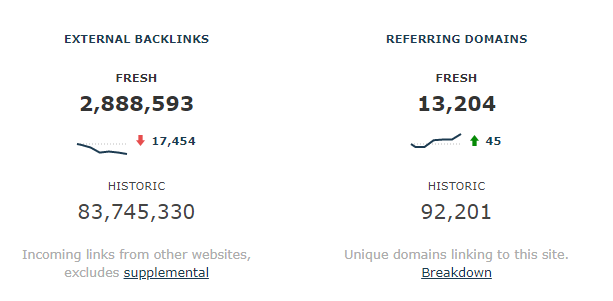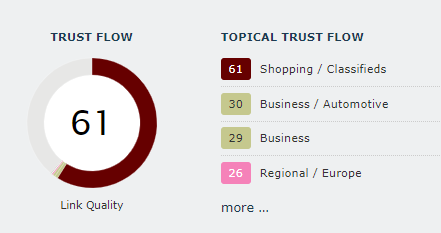E-E-A-T stands for experience, expertise, authoritativeness and trustworthiness and relates to how Google ranks webpages in the search engine results pages (SERPs)
E-E-A-T (the artist formerly known as E-A-T) derives from Google’s Search Quality Rating Guidelines which is designed to establish what it takes to create a good-quality website with strong ranking potential.
Let’s take a closer look at what experience, expertise, authority and trustworthiness really means…
Experience
The new ‘E’ for Experience in E-E-A-T was rolled out in December 2022, adding an extra element to Google’s quality rater guidelines. What this latest addition essentially means is that Google is looking for content that clearly demonstrates a degree of experience relating to the product, information or service being promoted. So, if someone is looking for information about hiking in Scotland, the search engine results pages (SERPs) should promote content from a source that has experience of hiking in Scotland. Similarly, if someone is looking for a specific type of bike, Google wants to ensure it presents the user with content created by someone who has direct, first-hand experience of that particular bike.
Expertise
Expertise refers to the creator of the main content and considers their credibility. For example, a person who does not have any qualifications in healthcare but blogs their own theories and diagnoses of health-related issues is unlikely to rank above an established healthcare professional or service provider; essentially, expertise indicates that the writer is an expert of the topic in question. That said, in Google’s guidelines, they verify that expertise can be demonstrated less formally, such as in detailed reviews or forums - although this is less likely in YMYL (Your Money or Your Life) topics, depending on the content’s purpose.
Authoritativeness
Authoritativeness is all about proving your site is an authority in your area. The number of backlinks you have from relevant, authoritative sites helps to build your site up as an authority. For example, if your website is an online fashion retailer and fashion magazines begin to mention your brand in their online articles and link to your website, your authority can increase as search engines will start to recognise your site as recommended and trustworthy.
Trustworthiness
Trustworthiness is exactly how it sounds - how trustworthy your site is. This can be demonstrated by having a secure domain which protects users’ personal information and through positive customer reviews. It’s worth noting that If you receive too many negative reviews, search engines will interpret your site to be poor quality which will impact your position on the SERPs.
How does Google use E-E-A-T?
There is a common misconception that E-E-A-T is an algorithm, but actually it is a concept that feeds into Google's search algorithm when evaluating the quality and relevance of a website and its content. People known as Google search quality evaluators assess the quality of websites based on the criteria outlined in the Quality Rater Guidelines and then provide feedback, which is used to help refine and improve the algorithm. This means that the feedback provided by these evaluators can have an impact on the ranking of all websites in Google search results.
Why is E-E-A-T important for your business?
Demonstrating that your business has E-E-A-T can seriously bump you up on the SERPs. This is because search engines such as Google can see that your website is trusted, recommended and legitimate. It’s likely that you’ve come across some shady websites during some of your previous online searches and this is what Google is trying to prevent users from coming across on its platform. For example, it could be dangerous for an unauthoritative website to rank at the top of the SERPs if it is providing false information (especially if it’s health or finance related). It’s for this reason that Google will take into account the E-E-A-T of a website to protect its users from harm and to ensure only quality content that meets the user’s needs is provided. As you can see in the image below, the NHS is the first result for this health related query as they are a trusted website in the UK with experience, authority and expertise.

In this instance, E-E-A-T is vital for the health and safety of online users, but E-E-A-T is useful in other respects as there are different types of “expert” websites (including forums and gossip websites!).
Let’s look at this next example...

As you can see, the user is possibly looking to make a purchase on this occasion, so there’s an opportunity for car dealers to make a sale or receive an enquiry through the SERPs. Google has also kindly provided a ‘local pack’ so the user can find car dealers near them.
The top result for this search is Autotrader, the UK’s largest digital automotive marketplace, so we did a little research to find out why…
Firstly, we used the trusty SEO tool Majestic to explore their referring domains, backlinks and trust flow. As you can see in the below image, Autotrader’s root domain has a LOT of backlinks (with a whopping 2,888,593 in the last 90 days from 13,204 different domains!) It’s also important to note that these links are considered to be of good quality and judging by the topical trust flow, they’re relevant to the automotive business sector.


Moreover, Autotrader’s website has a rating of 4.7 from over 50,000 customer reviews on Trustpilot, which also contributes to their site’s trustworthiness and authoritativeness.
Similarly, Google’s Local Pack results also feature positive customer reviews, indicating that Google has taken these into consideration as part of their ranking factors. The key takeaway here is that by working on your E-E-A-T, you can improve your brand’s digital presence and attract more traffic to your site (and hopefully, increase leads and sales too!)
How to improve E-E-A-T SEO
Improving experience
Ask yourself this: would you trust a product description written by someone who has actually used the product in question, or would you place your trust in a description written by someone who has not used it?
You would naturally choose the former. But how can you demonstrate experience to your target audience?
Share personal experiences:
Share your own personal experiences related to the topic or product you are creating content for. This can be in the form of a blog or article and include observations, anecdotes, tips and hacks that demonstrate your firsthand knowledge of the subject.
Include examples:
Use examples to illustrate points and show definitive understanding of the product or topic. These can be from your own experiences or from others, as long as you provide context and explain their relevance. Examples can also be provided in the form of images, case studies or videos, e.g. a clip of you giving a demo on how to use a product.
Cite sources:
Use credible sources to support your points and provide additional information on the topic in the form of external links.
Use technical language and keywords:
By using technical language and industry-specific keywords related to your webpage, you’re demonstrating to your audience you have expertise in the subject.
Improving expertise
You can improve your website’s expertise by ensuring that you understand what your audience is really searching for and meeting their needs. The first step in doing this is to conduct keyword research and then develop a strong keyword strategy. Really grasping user intent is worth the time and effort because when you understand a user’s motives, you can cater to them.
Once you’ve established your target audience and their needs, you can create useful content for them. Regularly blogging about a related topic to your products or business is a great way to do this. For instance, if you are a health food store, you could post about healthy meals and share recipes. It’s also important to ensure that content is easily digestible. In the case of creating recipe-based blogs, you could include video demonstrations or use numbered lists to clearly layout the steps involved. Moreover, you can always get ahead of the game and include related search queries in your content so that you answer as many queries the user may have as possible - demonstrating your brand’s knowledge and expertise.
Improving authoritativeness
There are a few different ways that you can improve the authority of your website, including:
Link building
Link building is absolutely invaluable in the world of SEO and backlinks are an active ranking signal. If you can get other relevant websites which have authority to link to your website, it essentially tells search engines that others are recommending your brand and indicates that you also have expertise. Find out more on how to build links for SEO here.
You can check your domain’s authority score using a tool such as Semrush and can even discover websites who have mentioned your site or opportunities to build links and boost your authoritativeness.
Utilising social media platforms
Sharing your content and interacting with leads and customers will work wonders for building your brand, especially if it leads to more people searching for your brand directly. If you can demonstrate consistency and get your content out there, you will grow your authority.
Improving trustworthiness
Ensure that your web domain is secure
Back in 2014, Google announced that HTTPS (Hypertext Transfer Protocol Secure) would be used as a ranking signal. Essentially, HTTPS is a secure internet protocol that will protect users’ data, so it’s a good idea to migrate from HTTP to HTTPS to prevent yourself being flagged as not secure.
Why not read our ‘different types of website migrations’ blog to learn more about what site migrations involve and how we can help.
Encourage customers to leave reviews
You could have the happiest customers in the world who would gladly sing your praises...but Google won’t know this unless they leave a review. Gently encourage clients and customers to leave you a review if they are happy with your service or consider featuring customer testimonials on your website as this will help to strengthen your brand’s trustworthiness, experience and authoritativeness. Websites like Feefo, Trustpilot and even Google itself, all offer users of services the opportunity to leave reviews which can help to build trust in your brand.
Deal with negative reviews
Don’t let negative reviews stack up by addressing them sooner rather than later. As mentioned earlier, if your business receives too many negative reviews, your website will be seen as poor and untrustworthy, because in Google’s eyes, you’re clearly disappointing users and customers somewhere along the line.
Include privacy policies, refund/return policies and a terms and conditions page
These should be easily accessible for users to find (they’re typically found in the footer).
Include NAP information
NAP stands for name, address and phone number - including these details will help search engines to identify your location and will also make it easier for users to get in touch with you. Create a Google Business Profile to verify your business to Google as well as ensuring that any place your business is mentioned online, also has the correct information to build a consistent footprint across the internet.
Want to improve your E-E-A-T?
Working on your E-E-A-T can help to improve your business’s online visibility, helping to generate more leads and sales. Here at Adido, our team of SEO experts know exactly how to boost your brand’s E-E-A-T to help you reach your goals.
Find out more about the services we offer at our SEO agency in Bournemouth or email us at [email protected] to see how we can help.




